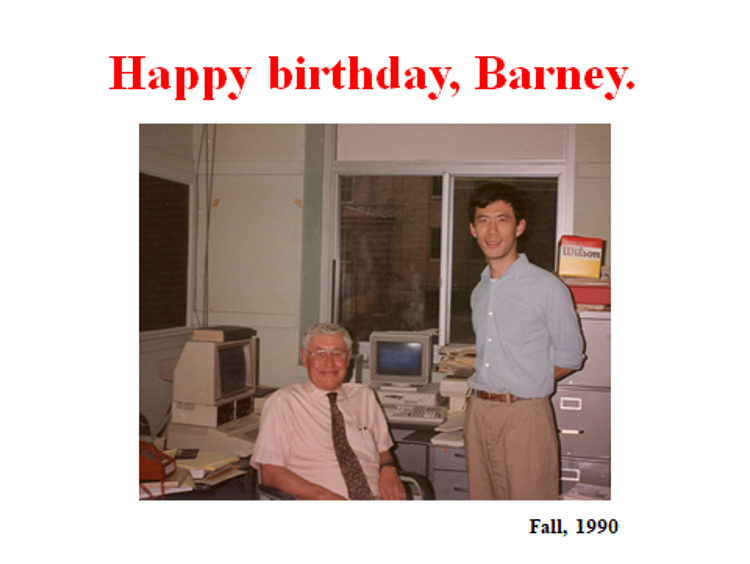University of Wisconsin–Madison Professor Emeritus Maurice Barnett “Barney” Webb passed away January 15, 2021 in Middleton, WI. Professor Webb earned his both his bachelor’s (’50) and doctoral (’56) degrees from the UW–Madison Physics Department. After graduating, he went to work at General Electric Research Laboratory as a staff scientist. In 1961, he returned to UW–Madison as a tenured Associate Professor of Physics.
Several of Barney’s former students and colleagues recently shared memories of Barney, which are compiled below with the students listed in chronological order of when they graduated.
Jim McKinney, Ph.D. 1966
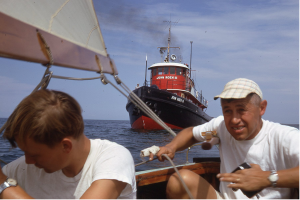
So what’s your favorite image?
I have a million.
In the classroom taking off his jacket and hanging it over some utility line?
In the lab, tripping over lines to the mercury diffusion pump?
In his office? Reviewing data or write-up?
Hurrying down the hall, looking for someone to sell him a cigarette for a quarter?
My favorite might be: Barney at the helm of Half-Hitch on Lake Superior. Pure joy!
Max Lagally, Ph.D. 1968
My favorites: tripping over diffusion pump lines — and i used that a few years after for an excuse not to get too close to equipment. The students much preferred that I get money and stay out of the way. My second favorite of your [McKinney’s] list is trying to buy a cigarette for a quarter. And of course the sailing.
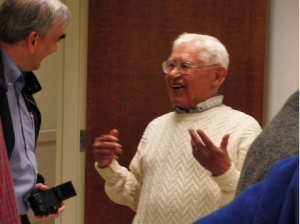
In the photo Barney with Dan Gelatt, for those of you who do not know Dan, Dan was an undergrad working with me in the lab. Dan figured out everything I was doing in less than a month and improved on it. He had a 4.0 GPA in physics, went on to Harvard and got a Ph.D. in theoretical condensed matter physics, then became a Harvard Fellow, developed at IBM the process of simulated annealing for siting transistors on chips, got an APS prize for that, was a Regent of the University of Wisconsin and so on. Dan might be smarter than Barney, but I don’t know. What always scared me is when Barney started saying “I don’t know anything about this, but….” and then proceeded to demonstrate that he knew all about it.
Jim Schilling, Ph.D. 1969
Max Lagally, Bill Weber and I were the second group of students that Barney took on around 1965, at roughly the same time. He bemoaned more than once that taking on so many students at the same time was going to be tough. The work I did with Barney was perhaps the best of my career. His physical insight was phenomenal. He would tell me what the results of my experiments meant and leave it up to me to work out some mathematical framework or model. Those were the only two things I do a little better than Barney — mathematics and spelling.
I really liked Barney and will miss him very much. I was planning to visit him last summer during a trip to the US (I now live in Munich in retirement), Madison in particular where I also have a son Paul and two grandsons. Covid nixed those plans — maybe next summer.
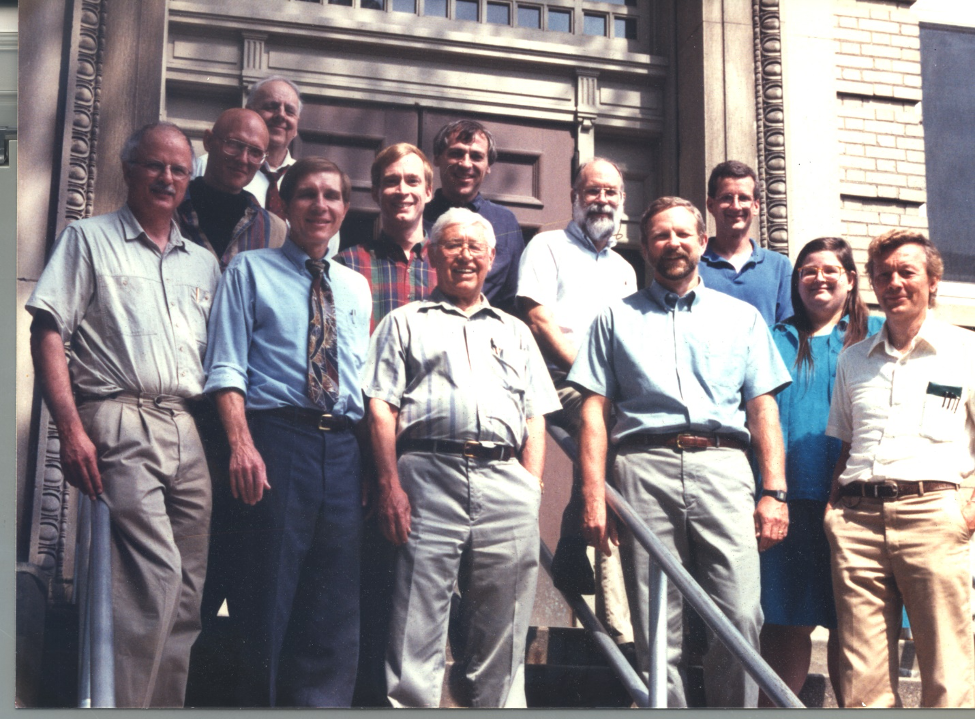
Bill Unertl, Ph.D. 1973
Barney was one of the most important influences in my life: he gave me a work-study job that made it financially possible to stay at UW; he didn’t hesitate to offer to lend his car so I could rush home when my father was badly injured at work; he spent countless hours getting me ready for prelims; he didn’t say an angry word when I burned out the first channeltron in the lab; he taught me how to keep a good lab book; he taught me how to write, and re-write, and re-write a paper until every possible ambiguity was clarified; and much more. He got me my first postdoc at Cornell, and whenever we met at meetings, he always sat me down to find out about my current research and how my family was doing. He and Fran invited us to his home several times each year, and they even came to parties at my apartment during the hippy days of the late 1960s!
Phil Cohen, Ph.D. 1975
I agree with what you all said. He will be missed.
One of many things he taught me was how much one could get out of a simple diagram. Nothing much more than a circle. You know which one.
Incidentally, I was able to speak with him the day before he passed. He said he felt fine. He was still sharp, and when I told him that I was retiring he was very kind in his comment.
I am not sure what triggered this memory but — When we were leaving Vietnam, near the last moments, Barney realized that Tran could be in danger. He was terribly worried and called everyone he knew. I don’t know the details and perhaps Dan Gelatt’s father was involved. I think it was the result of his extraordinary efforts that Tran was able to leave. (Maybe Max and Dan know more.) [Tran Ngoc got his Ph.D. with Barney in 1982. He passed away in 2014 (ed.)]
I don’t know more other than he was on the last plane out, and he described to us how he went to the roof of some building — embassy maybe — and the helicopter got him and his family. (Max Lagally)
Peter Bennett, Ph.D. 1980
My lasting memory of Barney is the fatherly mentoring he offered. Look at all the physics Profs he produced! Most of us, I expect, hoped to create the same structure with our students. I mostly fell short on that. I credit Barney’s success to his strength of personality and his intrinsic talent and enthusiasm — plus a large number of “above average” students, of course. Cheers!
John Unguris, Ph.D. 1980
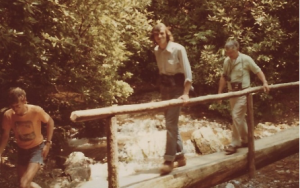
I probably would not have made it through grad school without Barney’s patience and persistence. He also had the good sense to push me along when I started to get too comfortable at Madison.
A few memories:
- Barney comes into my office, flips over a waste basket to use as a stool, lights up a smoke, and proceeds to talk about physics or wood working
- Learning that writing a paper was best done in free hand on a yellow pad with your feet up on the desk
- Sharing long drives with Barney and other grad students to conferences. Learned some about his past experiences at GE and the Navy. On the way home he’d clarify what was presented as well as give candid opinions of the presenters.
Ed Conrad, Ph.D. 1983
My first conference as a graduate student with Barney was very memorable. I do not have a picture but I remember listening to an invited talk with Barney by Uzi Landman on growth simulations.
After the talk he went up to Uzi and told him [let’s just say he said something a tad vulgar (ed.)] I couldn’t believe that professors spoke that way!
I also remember when Jack Rowe came to our lab for a month. He and Jack were doing an experiment with then-graduate student Peter Bennet. Every day they would work on Peter’s equipment. Peter gave them their own notebook separate from the one he was keeping. One day I asked Peter why he was using a separate book. He told me “that theirs was the book that would go on the shelf after Jack left that no one would ever look at again.”
Finally, I had been building a changing table for my soon-to-be-born first son. The day he was born, I hadn’t finished. Barney invited me over that night to help finish it. I remembered a lot of beer drinking and cigarette smoking while operating table saws. We got it done and still had all our fingers.
Barney was like a dad to me.
Ray Phaneuf, Ph.D. 1985
I stayed in touch with Barney over the years, using the American Birkebeiner Ski Race and swims across Lake Mendota as excuses to visit with him.
One of the many things that struck me was his generosity with his time. A few years ago, we were having lunch on the Memorial Union Terrace after a lake swim, and he suddenly looked at his watch, and said: “I’ve got to go — I have a meeting with the Dean.” This was 20 years after his (nominal) retirement. Another time we were in his office in Chamberlin Hall and there was a knock on the door: a white-haired professor said to him, “Now Barney, don’t forget you promised to talk to us about the recent gravity wave experiments.” He hadn’t forgotten.
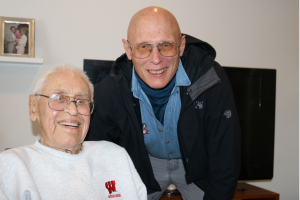
He had a talent for putting students at ease, talking about whatever we wanted.
Although he had strong opinions (especially about science), he was always reasonable in his approach — walking away from conversations that “generated more heat than light.”
I also remember him helping me to practice my first conference talk — he was at least as nervous as me. I could tell I was making progress when upon finishing I could see the floor under all the cigarette butts. In 1990 or so I remember giving an invited talk at the APS March Meeting along with other of his former students. He wasn’t allowed to smoke and pointed out, “this isn’t fair,” clearly in need of a smoke.
By the way, his son Richard tells me he got in one last cigarette a couple of days before passing, and passed peacefully in his sleep.
I agree with Ed Conrad; he was like a second father to me. I’ll miss his wise counsel.
Yuan-Wu Woody Mo, Ph.D. 1991
He really created my passion for physics more than anyone!
Brian Swartzentruber, Ph.D. 1992
I had a chance to talk with him for a while on his birthday last year. I’m glad that I had that time with him.
Tributes from department colleagues
Franz Himpsel
Here is a link to Barney’s citation for the Davisson-Germer Prize, one of the top prizes of the American Physical Society:
It is particularly notable that during Barney’s career the big industrial research labs (Bell Labs, IBM, Xerox,…) dominated at the cutting edge of research in condensed matter and surface physics — Barney’s specialties. Compared to a university professor, their research staff members had vast resources available — not only financially but also via interactions with expert in-house colleagues. Despite the odds, Barney kept up with them by devising clever experiments and building most of his equipment together with his students. It probably helped that he was already part of that club at the General Electric Labs before joining UW-Madison.
Bob Joynt
I probably had lunch with Barney 4000 times over 30 years, the last time when he was 92 and still coming in pretty much every day. He was the same age as my father. However, he was not a mentor but a protector. He shielded me every day from everything that is boring in life – he was a person always interested in everything and approached it all with the most lively intellect. I never remember a moment in his company that was not absorbing and fun.
Pupa Gilbert
I would like to add, to what all others have brilliantly said, that Barney had a terrific sense of humor and was an intrepid cyclist for most of his life. As he aged, he said that uphill roads “got steeper and steeper” so he stopped biking on them.
Mark Eriksson
Barney was a great mentor and role model in so many ways. Always understated about his own accomplishments, and always willing to offer advice when asked. This was certainly true throughout my time on the faculty since 1999, when Barney was supportive and encouraging from day one. But it was true for me far earlier than that. At 9am on February 28, 1987 I met with Professor Webb in his office. He had agreed to talk to my father and me about choosing an undergraduate college, since I was interested in physics. I was a 17 year old high school junior from Madison LaFollette. Barney didn’t know either my father or me, and the 28th was a Saturday. None of that mattered, and he was happy to take the time to talk with us. When I joined the faculty years later, I of course remembered that conversation, and — I now know it should not have surprised me — so did he.
Dick Dexter
I am one of the earliest members of the department to know of Barney’s value. Although younger than old-timers like Haeberli (or Barney himself) I can say farewell and sleep in peace.
Lou Bruch
Just want to add a few remarks. Barney was a very good counselor on university affairs. He also was a competitive gardener, for instance on the question of first ripe tomatoes and last ripe strawberries. He will be missed.
Duncan Carlsmith
Sad news! Barney will be missed by those here who knew him.
Willy Haeberli
Yes, a very nice colleague, so even tempered, a good scientist.
Even a year younger than I am!
Aimee Lefkow
Barney was such a sweet fellow.
Tributes from Other Colleagues
Len Feldman (Bell Labs student of Barney’s)
I was not a Wisconsin student of Barney’s, but I was a Bell Labs student of his. In the early 1980s, maybe the peak of surface physics, I made a transition from atomic physics and particle solid interactions to surface science. We saw some opportunities. Although Bell Labs was one of the most accomplished surface science institutions in the world, I knew enough to try and learn from a real Professor. I received permission to have Barney join us at Bell for a few summer weeks, basically to teach me surface science. We had a few intense weeks together, lunch each day, learning how to clean silicon at all hours, watching the Auger chart recorder for hints of carbon. In one instance I remember one of the Bell Execs coming in and, in a friendly manner, asking why it took more than one of us to watch the chart recorder. Unhesitatingly Barney explained that science was a social activity and that was part of the fun! What a pleasure for me, what a fine memory to have. The real long-term benefit was to know Barney and have him as a friend.
Ruud Tromp (IBM Watson Colleague)
I am sorry to hear that Barney Webb passed away a few weeks ago.
Ernst Bauer and I were wondering in back-and-forth emails how Barney was doing, and then Ernst received an email from Peter Bennett, informing him of the sad news.
From your previous emails I know that his health has had some ups and downs in recent years. I hope he did not suffer in the end.
I will remember him as a kind and generous person, always curious of the work of younger scientists around him, and encouraging them in their pursuits.
And of course enthusiastic and contagious in his love of physics.
When I first met him he made me feel like what I did mattered, and he did that every time thereafter.
What more does a young scientist need for motivation?
Thank you Barney!
